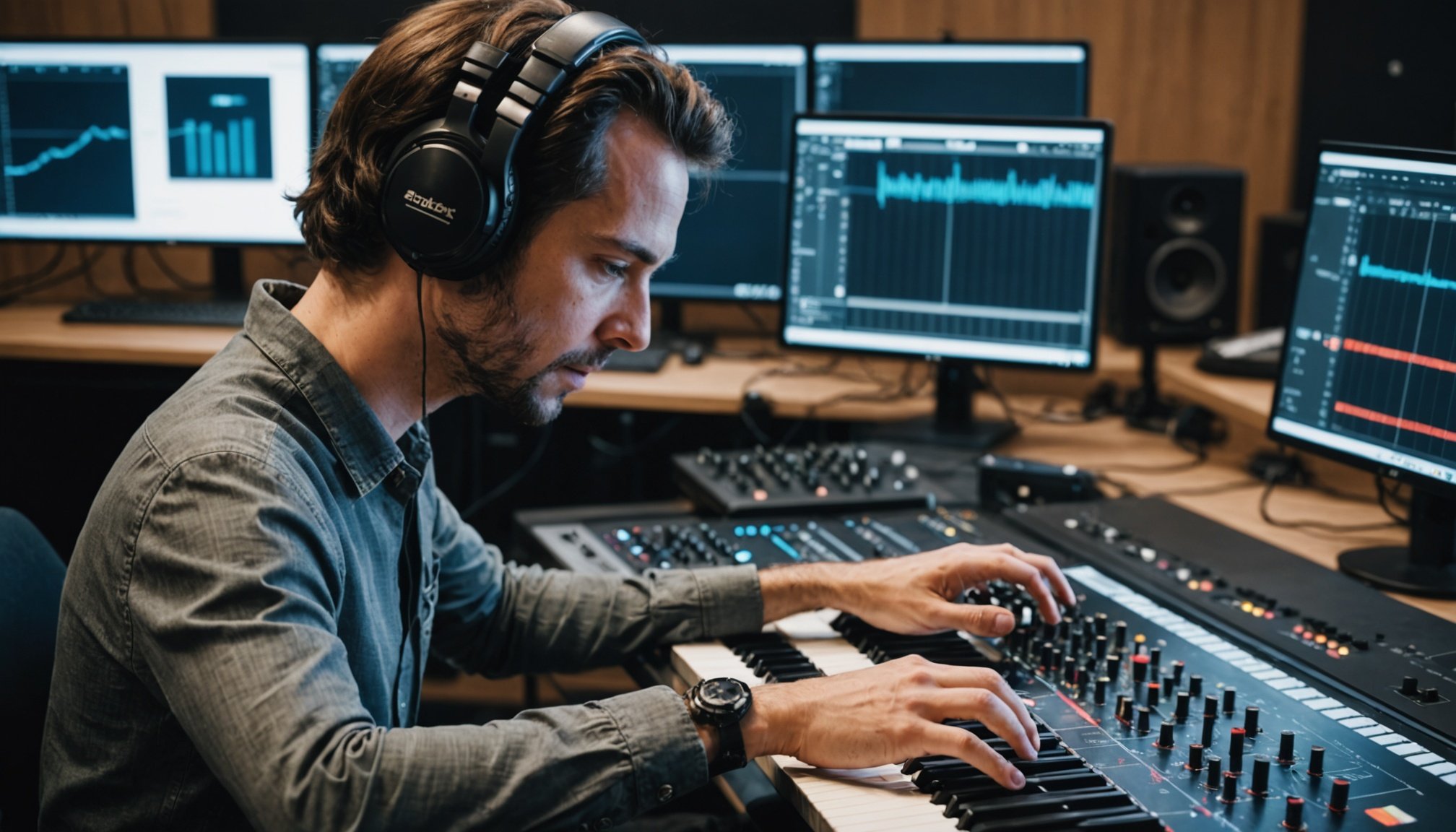Unlocking Creativity: How AI is Revolutionizing Music Composition and Sound Engineering
The music industry is undergoing a significant transformation, and at the heart of this change is artificial intelligence (AI). From composition to sound engineering, AI is redefining the creative process, opening new windows of opportunity for musicians, producers, and artists alike. In this article, we will delve into the ways AI is revolutionizing music composition and sound engineering, and what this means for the future of music.
The Rise of AI in Music Composition
AI has made tremendous strides in music composition, enabling the creation of original pieces that rival those composed by human musicians. This is largely due to the advancement of machine learning algorithms, particularly Generative Adversarial Networks (GANs) and other neural network technologies.
Also to see : Stay Ahead of the Game: Discover the Newest Trends in AI-Powered Cyber Threat Intelligence for Proactive Defense
How AI Composes Music
AI music composition tools like AIVA, Flow Machines, and Suno AI analyze vast datasets of existing music to learn patterns, styles, and structures. These tools can generate melodies, harmonies, and rhythms that blend seamlessly with human compositions. For instance, Suno AI can create production-ready songs in seconds, complete with natural-sounding vocals and contextually appropriate lyrics, a feat that was previously thought impossible for AI[1].
Here are some key features of AI music composition tools:
Also read : Unlock the fun: why you need a mystery box online today
- Efficiency: AI can generate new music in minutes, a process that would take human composers days or weeks[2].
- Unlimited Inspiration: AI algorithms can draw from a vast array of musical styles and genres, creating diverse and eclectic compositions[2].
- Creative Exploration: AI can generate entirely novel compositions, exploring new musical territory that human composers might not have considered[2].
Examples of AI-Generated Music
Several projects and tools have showcased the capabilities of AI in music composition:
- AIVA: This AI-powered composing tool has been used to create classical music, film scores, and pop songs. It was developed by a Luxembourg-based startup and has been used in various commercial projects[2].
- Flow Machines: Led by researchers at Sony Computer Science Laboratories in Paris, Flow Machines has produced an album called “Hello World,” featuring AI-generated melodies and lyrics[2].
- Suno AI: This tool marks a new era in AI music generation by creating complete songs with emotionally resonant performances and contextually appropriate lyrics from simple text prompts[1].
Enhancing the Music Production Process
AI is not only revolutionizing music composition but also transforming the music production process. From mixing and mastering to sound design, AI-powered tools are streamlining tasks and enhancing creativity.
AI in Mixing and Mastering
Traditional mixing and mastering tasks, which can be time-consuming and complex, are now being automated by AI. Tools like those developed by Google DeepMind and OpenAI can perform these tasks in a fraction of the time it would take a human, allowing artists to experiment more freely and achieve professional-quality sound quickly[3][4].
Here are some ways AI is enhancing the music production process:
- Speed and Efficiency: AI can adjust levels, EQ, and compression in real-time, significantly reducing production time[3].
- Creative Freedom: With AI handling the technical aspects, musicians and producers can focus more on the creative aspects of music production[3].
- Cost-Effective: AI tools eliminate the need for expensive studio time and hiring multiple musicians, making high-quality music production more accessible[2].
The Role of GANs in Music Generation
GANs have been instrumental in the advancement of AI music generation. Here’s how they work and their impact on music creation:
How GANs Work
GANs consist of two neural networks: a generator and a discriminator. The generator creates fake data (in this case, music), while the discriminator tries to distinguish it from real data. This adversarial process leads to the generator producing increasingly realistic outputs[1].
The Power of GANs in Music
GANs capture complex musical patterns and relationships, enabling them to generate original compositions that maintain consistency in style and structure while introducing creative variations. Here are some key benefits of GANs in music generation:
- Complex Musical Elements: GANs can learn subtle nuances of musical style, harmony, and structure directly from data[1].
- Fine-Grained Control: Tools like StyleGAN offer sophisticated control systems, allowing musicians to independently adjust specific musical elements without affecting the entire composition[1].
- High-Quality Audio: GANs can generate high-quality audio, making them particularly powerful for practical music production[1].
The Impact on the Music Industry
The emergence of AI-generated music and AI-powered production tools is having a profound impact on the music industry.
Disruption of the Creative Process
AI is disrupting the traditional creative process of music creation. While some fear that AI could replace human composers and musicians, others see it as a tool that enhances human creativity. Here are some points to consider:
- Replacement vs. Enhancement: The debate continues on whether AI will replace human musicians or serve as a complementary tool. Many believe that AI can enhance the creative process by automating routine tasks and providing new inspiration[3][4].
- Democratization of Music Creation: AI is making music creation more accessible to people without traditional musical training or access to expensive equipment. This could lead to a more diverse and eclectic range of music being created and shared[2].
Ethical Implications
As AI becomes more integral to music creation, ethical questions arise. Here are some of the key concerns:
- Originality and Ownership: Can AI-generated music be considered truly original? Who owns the rights to AI-created content? These questions challenge industry norms and highlight the need for regulations that protect human creativity while embracing technological advancements[3].
- Human Touch: Some experts worry that an over-reliance on AI might dilute the emotional depth of compositions. However, many believe that AI can serve as a powerful complement to human creativity, enhancing rather than replacing the artistic process[4].
Personalized Recommendations and Discovery
AI is also changing how fans discover music. Platforms like Spotify and YouTube use machine learning algorithms to analyze listener preferences, creating highly personalized playlists and suggestions.
How AI Enhances Music Discovery
- Pattern Analysis: AI algorithms analyze the listening patterns and tastes of millions of users, exposing listeners to new artists and genres they might never encounter otherwise[3].
- Real-Time Recommendations: AI can provide real-time recommendations based on current listening habits, ensuring that users are always discovering new music that resonates with them[3].
Practical Insights and Actionable Advice
For musicians, producers, and artists looking to integrate AI into their creative process, here are some practical insights and actionable advice:
Embrace AI as a Tool
- Collaboration: View AI as a collaborative tool rather than a replacement. Use AI to generate ideas, automate routine tasks, and enhance your creative output[4].
- Experimentation: Don’t be afraid to experiment with different AI tools and algorithms. Each tool has its unique strengths and can offer different creative possibilities[1].
Understand the Capabilities and Limitations
- Capabilities: AI can generate high-quality music, automate mixing and mastering, and provide personalized recommendations. However, it is essential to understand what AI can and cannot do[3].
- Limitations: While AI is powerful, it still lacks the emotional depth and human touch that a human composer or musician can bring to a piece. Use AI to augment your creativity, not replace it[4].
AI is revolutionizing the music industry in ways that were previously unimaginable. From composition to sound engineering, AI is opening new avenues for artistic expression and collaboration. As technology continues to advance, it is clear that AI will play a significant role in shaping the future of music.
The Future of Music
- Human-AI Collaboration: The future of music will likely involve a seamless collaboration between human musicians and AI tools. This collaboration will enhance creativity, streamline the production process, and open up new possibilities for musical expression[3][4].
- Innovation and Creativity: AI will continue to inspire new discoveries and breakthroughs in music composition, ensuring that the music industry remains vibrant and innovative[2].
In the words of a musician who has worked with AI-generated music, “AI is not here to replace us, but to enhance our creativity and push the boundaries of what is possible in music.” As we move forward, it is exciting to think about the new window of creative possibilities that AI has opened for musicians, producers, and artists.
Table: Comparing AI Music Composition Tools
| Tool | Key Features | Use Cases |
|---|---|---|
| AIVA | Composes classical music, film scores, and pop songs; used in commercial projects[2] | Film scores, commercial music, classical compositions |
| Flow Machines | Analyzes existing music to generate new compositions; produced the album “Hello World”[2] | Experimental music, album production |
| Suno AI | Creates production-ready songs with natural-sounding vocals and contextually appropriate lyrics[1] | Pop music, commercial music, quick composition |
| StyleGAN | Offers fine-grained control over musical elements; generates high-quality audio[1] | Professional music production, style transfer, arrangement generation |
| Endless AI Composer | Generates ambient music in real-time; allows user interaction through parameter adjustments[2] | Ambient music, relaxation music, focus music |
Detailed Bullet Point List: Advantages of Using AI in Music Creation
-
Efficiency:
-
Generates new music in minutes.
-
Automates mixing and mastering tasks.
-
Reduces production time significantly[2][3].
-
Unlimited Inspiration:
-
Analyzes vast amounts of existing music.
-
Generates compositions that draw from various styles and genres.
-
Offers novel and eclectic musical ideas[2].
-
Creative Exploration:
-
Explores new and uncharted musical territory.
-
Generates entirely novel compositions.
-
Enhances the creative process by providing new ideas and inspiration[2].
-
Cost-Effective:
-
Eliminates the need for expensive studio time.
-
Reduces the cost of hiring musicians.
-
Makes high-quality music production more accessible[2].
-
Fine-Grained Control:
-
Allows independent adjustment of specific musical elements.
-
Enables the blending of different musical styles smoothly.
-
Provides sophisticated control systems similar to professional mixing consoles[1].
By embracing AI as a tool rather than a replacement, musicians and producers can unlock new levels of creativity and innovation in their work, paving the way for a future where human passion and machine precision come together to redefine what music can be.











